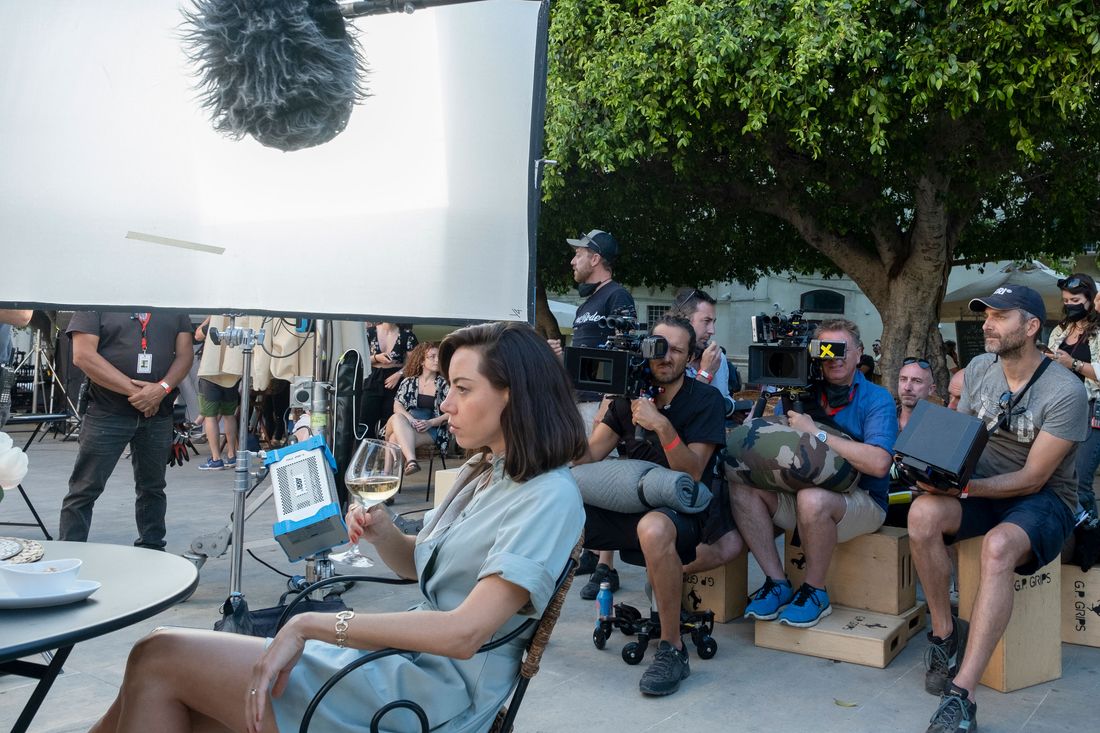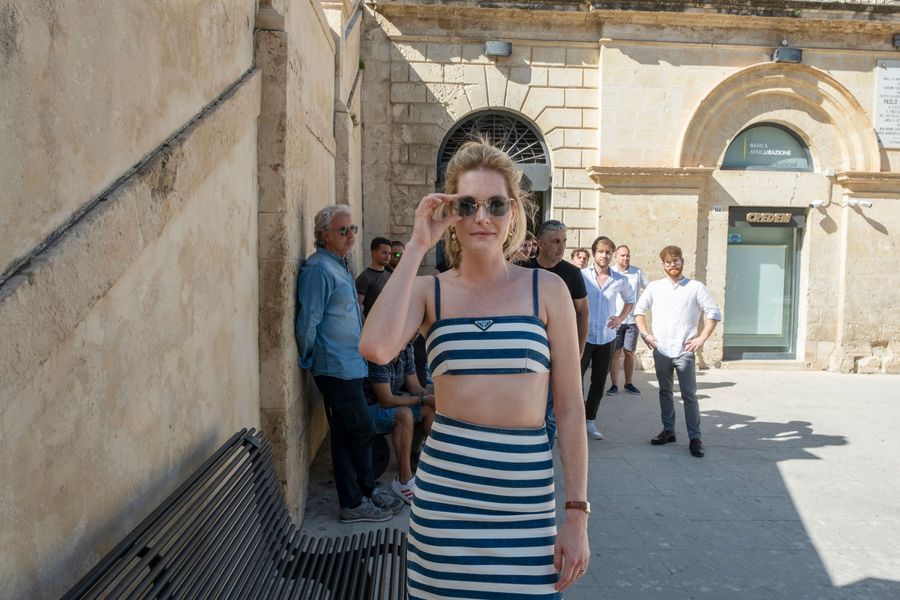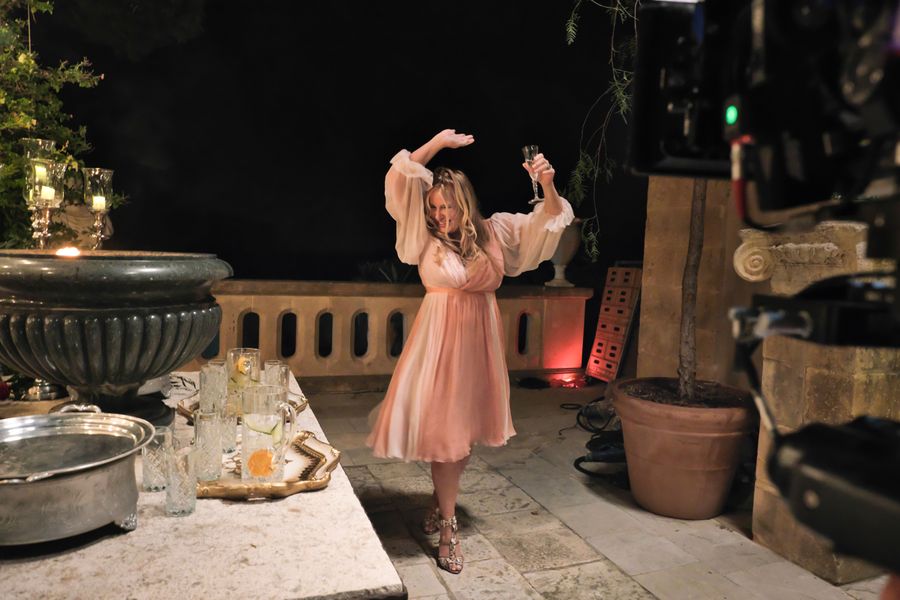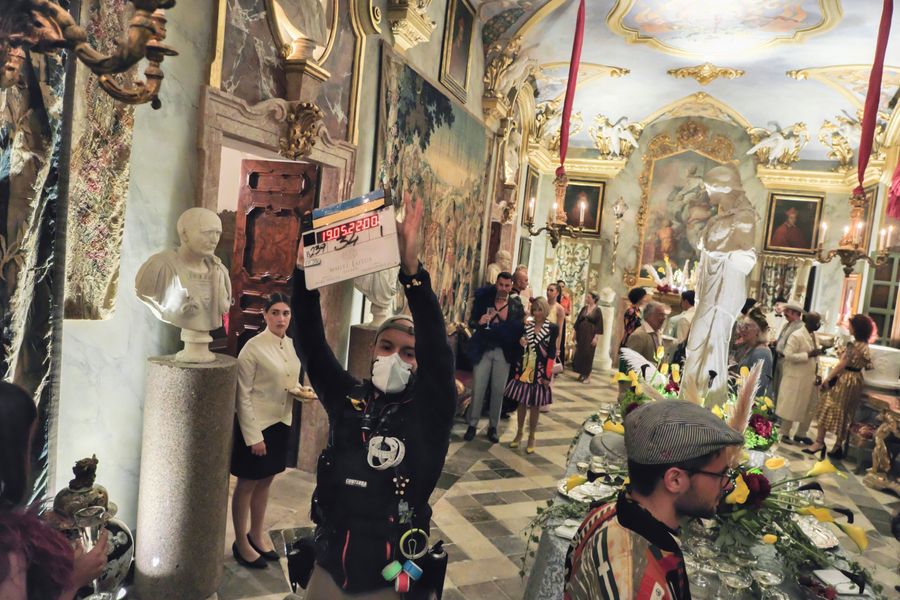
Two American women sit in a limestone piazza exchanging barbed pleasantries: the newly rich Harper, affecting European glamour with a teal scarf and an arched eyebrow, and the comfortably moneyed Daphne, wearing a cropped blue-and-white Prada two-piece. Harper reclines defensively across from her companion, who is scoping her out like a lioness with a glinting smile. Harper has a job. Daphne does not. The women seem to resent each other in the subtle ways of people who insist they should be friends. They are on a day trip in Noto, a town famous for its Baroque architecture and described as “Sicily’s hidden gem” in 2016 by Condé Nast Traveler, something both of them would have read — Harper probably while telling herself she was doing it ironically. Bells ring in the background. Children wander across the square. The caffè down the street sells Italy’s best granita. It’s the kind of evening that could convince you the things they write in magazines are true.
Paradise with the hell of other people: It’s the second season of The White Lotus, the HBO series about the rich and their discontents, which has decamped from its Hawaiian setting to follow a new group of American noblesse on vacation in Sicily. As the scene between Harper and Daphne — played by Aubrey Plaza and Meghann Fahy, respectively — resets, a man from the film crew emerges to grab a white wine resting on the table between them that has started to sweat, replacing it with a pristine glass.
The White Lotus’s writer, director, and creator, Mike White, 52, slips into the scene. He’s a wisp of a figure watching them act from behind a monitor in a polo shirt and baseball cap while munching on a vegan dinner. This conversation may not seem like much on the surface, he says, but it needs to probe all the unspoken tensions between the two women. They do not know each other well; Harper’s husband, Ethan (Will Sharpe), and Daphne’s husband, Cameron (Theo James), were roommates in college. Cameron, a finance bro in the vein of Jake Lacy’s asshole Shane from season one, was always wealthier than Ethan. Then Ethan made a killing from selling his tech company. Suddenly, Daphne and Cameron decided to invite Harper and Ethan on vacation. As soon as they arrive at the resort, the quartet falls into a millennial Who’s Afraid of Virginia Woolf? Are Cameron and Daphne welcoming Ethan and Harper to the world of money, or is that resentment glimmering beneath the surface? “I can make something of that,” White tells Plaza in his upward Pasadena lilt between shots, his mind already on the edit. “You saying, ‘You don’t work,’ and her reacting.”
In the grand tradition of HBO shows about white people behaving badly, the first season of The White Lotus was a critical hit — appointment viewing for those who like to debate television online — and ended up with 20 Emmy nominations. White’s Hollywood career has ranged from the acclaimed indie film Chuck & Buck to the breakout hit School of Rock to for-hire gigs like The Emoji Movie, but nothing has brought him as much attention as this.
For the second season, White persuaded the network to send him to Italy. In addition to the young lovers, there are three generations of Italian American men traveling back to their ancestral country; season one’s blowsy, self-deluded, yet fragile heiress, Tanya McQuoid (Jennifer Coolidge, who just had to return), and her dissatisfied assistant; and two young Italian women who get caught up in everyone’s business. The first season focused on the way the rich perpetuate the structures of colonialism with casual cruelty, all while deluding themselves into thinking they’re good people. In season two, White has pulled back from writing about the power dynamics between guests and employees; here in Sicily, he was drawn to the myths of masculinity and femininity and to one of his recurring fascinations: the particularities of jealousy, especially of the sexual kind. White loves the types of feelings that involve wishing you were someone else or somewhere else. He chooses to describe this season as “a bedroom farce with teeth.”
Season two is also HBO’s gamble on the creator, who has been given almost complete control — and the license to travel around the world to luxurious hotels — to spin his obsessions and anxieties into a burgeoning TV franchise. “I feel like I’ve cracked the code,” White says. “And I really don’t want to fuck it up.”
The White Lotus was originally a child of necessity. When the pandemic hit in early 2020, White was in Finland on the verge of shooting a film that would star himself and Plaza as exaggerated versions of themselves bumbling through Scandinavia based on Plaza’s own experiences of trying to reconnect with her high-school boyfriend, a Swedish exchange student. White’s longtime producer, David Bernad, booked him an emergency flight home just before the borders closed for a COVID travel ban, and funding for that film collapsed. Back in the States, White and Bernad did their best to try to get the project off the ground again. They spoke with a couple of “New York tech bros,” who, according to Bernad, “did not seem sensitive enough to make this movie,” then the pair decided to walk away from it.
So White turned back to an old love: travel. He set off on a road trip with his dog across America. Before leaving, he sent an email to HBO’s head of drama, Francesca Orsi, with whom he had stayed in touch after Enlightened, the bristling comedy-drama that arguably rebooted Laura Dern’s career, saying he was in need of a project. Orsi happened to be looking to fill a gap in HBO’s 2021 schedule and said if he could come up with something to film in a COVID bubble and air by then, HBO would be interested. “Mike is brilliant, and he’s also fast,” Orsi tells me. “He is one of those people who you call him and six weeks later he has six scripts for a season — and two months later you’re shooting a season.”
Even before The White Lotus premiered, White had the idea that it could grow to multiple installments. Think of a cool location with a luxury hotel, throw in a bunch of morally ugly Americans, and see what horrors may unfold. He’s not someone who thinks in terms of multi-season architecture, so an anthology felt like a good fit. HBO was initially interested in only one season, until the show started to air last summer. By the fall, White and Bernad were off to Europe scouting potential hotels along the Mediterranean, from St.-Tropez, across the French Riviera, and down the coast of Italy — they needed to find a place warm enough to film in that winter. Also, wouldn’t you want to go on vacation somewhere between St.-Tropez and Sicily?
They settled on the Four Seasons San Domenico Palace (similar to the outpost in Maui that featured in the first season) nestled among the cliffs of Taormina, a resort town in the foothills of Mt. Etna that overlooks the wine-dark Ionian Sea. The hotel would be closed for the winter, so they could start filming during the off-season. And the place didn’t lack personality, as some mega-resorts they visited did. The San Domenico Palace was built within a renovated convent near an ancient Greek amphitheater, and according to the cast, it’s definitely haunted. (During the shoot, two of the actors had nightmares about a bald man standing at the foot of their bed on the same night.)
“I didn’t know shit about Sicily, to be honest,” White tells me, but he moved to the island after that scouting trip and wrote the plot of the second season between December and February. The first block of shooting took place in the bubble of the hotel; the actors who stayed there during filming described it as a strange adult camp. Haley Lu Richardson and Adam DiMarco, two of the new cast members, and pop singer Este Haim, who was visiting the set as a musical consultant, nabbed an aux cord from the crew to put together a system for a karaoke night, kicking things off with a duet of “Summer Nights.” Reality and fiction blurred: They would film a scene in the dining room, then return to eat in the dining room. The hotel eventually opened for actual tourists, putting the White Lotus actors among White Lotus–esque visitors. “It was like a weird video game where we were living in a simulated reality,” Plaza says. “I liked not having that separation.” Once the special guests of the wait staff, they were suddenly among a much larger group of people. “We were all giving the new guests the side-eye, like, Who are these randoms?” DiMarco tells me.
But you don’t go to Europe just to stay in a resort, so this season the production travelled all over Sicily, leaving Taormina for Noto, Palermo, and eventually, after a few COVID delays, Rome, where a lot of the show’s many sex scenes were shot on soundstages. The added trips make the season more expansive, though not necessarily much more expensive. The budget, according to HBO, remained within the realm of the first season’s, reportedly under $3 million an episode. It helps that Italy offers up to a 40 percent tax credit to foreign productions and that, as with the first season, the new cast members agreed to work for, as White puts it, “not crazy money.” “He is delivering something fiscally impressive,” Orsi says.
White had an early idea for the latest installment: an Altman-like tableau in which everyone converges at a business conference. But while working in Palermo, he heard a local myth that stuck in his mind. It’s based on the teste di moro, ceramic heads that appear across the island, especially on balconies as pots for houseplants and on souvenir stands. The legend goes that around the 12th century, while Sicily was occupied by Arabian rulers, a young Italian woman was seduced by a Moorish man. When she discovered he had a wife and children, she cut off his head in a fit of jealousy and stuffed it with basil, which grew in abundance. The story — this vision of heightened jealousy, sex, and violence — hit on something White wanted to explore in America’s assumptions about a macho culture like that of Sicily, home of the Mafia and of great movies about the Mafia. He started to work out an idea about sexual politics.
“I didn’t want to get into colonialism,” he explains, “because I felt we did that in the first season.” I point out that the story of the teste di moro is about both sexual politics and colonialism: a virtuous, fair-skinned woman killing a foreign invader. Many versions of the Moor’s head depict him as a dark-skinned caricature, including earrings made by Dolce & Gabbana in 2012. Sex, race, and colonial constructs of power are entangled, and perhaps the show could, or would inevitably, deal with all three. “I guess I’m focusing more on the guy who’s lying to the girl,” White says. “Yes, he is a Moor, but to me it’s more about the adultery aspect.”
On both seasons, White has worked without a writers’ room. He directs all the episodes and exerts almost total control over the final product. After making the first season, he told Vulture that he works alone in part because “I still believe in art as the individual and as the universal. I want to find myself in the other,” he said, “and the point of it is that there is no other; it is you.”
The White Lotus has always been a show about White, in a sense. The first season kept scratching the open wound of a white American, like himself, who felt both entranced by and ashamed of the exploitative colonialist enterprise that is the Hawaiian vacation. It condemned the actions of its white characters, but it didn’t look away from them and to anyone else — the native characters, like Lani, who gives birth in the first episode, slipped off to the side of the show. The story stayed with the colonizers, and critics noted the colonized could seem like props. White felt his intentions on that front were read uncharitably. “I didn’t know that I had the gumption to wade into those waters again, knowing I was going to get sniper fire from every direction,” he tells me. “Maybe the classic sexual politics, the naughty subversive stuff we’re getting into, will take the edge off a little bit from that.”
He also says he wanted to pull back from the bite of the first season, which had a particularly acid, despairing tone. The characters talked in what he dubs “Twitterspeak,” regurgitating basic social-justice language at one another. One referred to himself and the other guests as “parasites” upon the earth. White didn’t want to chase that vibe all over again. “Some of the criticism of the first season, I was like, I get what you’re saying, but I’m not that,” he says. “I’ve written a whole body of work. I stand by that season of The White Lotus, but it’s not the full reflection of my interests.”
On the show, the teste di moro appear in the hotel room shared by Harper and Ethan. The two think of themselves as an enlightened, modern couple, able to talk through all of their emotions with therapy-honed ease. Plaza has played a slew of characters who butt against everyday convention, from the sardonic April on Parks and Rec to the potential sociopath in Ingrid Goes West, a film indebted to White’s homoerotic stalker movie Chuck & Buck. Here, White tells me he thought it might be funny to have Plaza play a “normie,” or at least someone who thinks of herself as normal, well adjusted, and skeptical of White Lotus–ian extreme wealth — until the wheels of the plot start turning. “I don’t necessarily think that some of the characters I play haven’t been normies,” Plaza tells me, deadpan. “But okay, she’s not a criminal; she doesn’t have any described mental illness. Although is anyone really a normie?”
Either way, Harper isn’t as much of a normie as she imagines herself to be once she gets to Sicily and starts hanging out with Cameron Babcock (James). Cameron flirts with Harper, though it’s hard to tell whether he’s truly attracted to her or engaging in mind games to enliven his marriage to Daphne. Both Plaza and Sharpe are biracial, while James and Fahy are white. They’re outsiders at the resort, in class as well as race, and think that, armed with therapeutic lingo and emotional oversharing, they’ve got their emotions sorted out better than their vapid friends. Maybe not. “Your sense of what makes a healthy relationship is challenged a bit,” White says.
As the sexual intrigue unfolds between these couples, their stories interlock with other dramas playing out across the hotel. Coolidge’s Tanya is on vacation alongside her beau from last season, Greg (Jon Gries). The actress is a close friend of White’s, and he just wanted to work with her again. (He has also imagined the possibility of bringing back season-one characters in, say, Japan, if there’s ever a third season.) Tanya is still adrift emotionally, hoping another trip might put her at ease. She engages in all the typical fantasies of an American in Italy, including an attempt to ride a Vespa, before a gay aristocrat played by the British “sex thimble” Tom Hollander discovers her at the resort. He becomes obsessed with Tanya, as a gay man is wont to do with any character played by Coolidge, and his clique of “international gays help her get her groove back,” as White puts it.
Tanya arrives with an assistant, a harried young woman named Portia (Richardson) who has taken the job after feeling stranded and alone during the pandemic. (Coolidge herself travels with an assistant who helps her manage things; on set, she was trailed by a harried young Italian man named Liam who always seemed to have a multitude of handbags spilling out of his grasp.) While at the resort, Portia meets a dweeby young Italian American guy (DiMarco) who is the son of a Hollywood producer played by The Sopranos’ Michael Imperioli and the grandson of a grumbling letch portrayed by F. Murray Abraham. Imperioli’s character has recently gone through a nasty breakup and is trying to keep his family together with a trip to the old country, where he’s hoping they’ll connect with relatives. The story grew out of White’s experiences traveling with his own father to find their roots in Sweden. “We ran into some woman at the cemetery who was the archivist of the town and knew the home where our family was from,” White says. “The opposite of what happens in this show, which is not such an ideal situation.”
Togetherness proves difficult across the three generations of men, each of whom has a different opinion on how males should behave in modern society. Abraham’s character, Bert, takes things to an old-fashionedly sexist extreme. The actor compares playing Bert to his experience of playing Bottom in the Public Theater’s A Midsummer Night’s Dream. “Most actors don’t want to let the audience think they’re buffoons, so they hold back,” Abraham says. “Mike gave me permission to be an asshole.”
Weaving between the stories of the vacationers are the locals. Foremost among them are a pair of young Italian women, Lucia (Simona Tabasco) and her best friend, Mia (Beatrice Grannò), who are as intimidating as the duo of college students from the previous season played by Sydney Sweeney and Brittany O’Grady. The two hang around the resort and provide the audience with commentary on the guests as they arrive, just as Sweeney and O’Grady did. And as the season progresses, they get entangled in the vacationers’ various dramas. Both actresses have a background in Italian television, and the characters speak to each other in their native language when they’re alone. Roughly 20 percent of the season’s dialogue is in Italian, translated into Sicilian with the help of White’s on-set assistant, Chiara Nanni.
Each iteration of a White Lotus resort must have its own fearsome hotel manager. Last time, there was Murray Bartlett’s Armond, a mentally fraying addict who ends up self-destructing while trying to fulfill his guests’ needs. This season, the Italian actress and comedian Sabrina Impacciatore plays a manager named Valentina. As inspired by White’s and Bernad’s experiences with Italian hospitality during their scouting trips, she takes a very firm approach to her guests. Initially, “I think they wanted a character who would be more rude than any Italian would be,” Impacciatore tells me. “In Italy, we are more direct. We just say what we think.”
The sun has set behind a villa perched in the hills south of Noto, and the gays have started to arrive. In half-darkness, they emerge from their trailers, primping their hair and adjusting their rompers, mingling and sharing cigarettes with a collection of older white women in caftans. The villa in question is a former monastery, available to rent for a cool €18,000 a week. It’s both opulent and, as an Italian crew member sniffs in passing, “not really Italian.” The crowd of people is also not really a crowd. The costume designer points out to me that many of the background actors populating the villa are in fact old friends of White’s. That’s his trainer. That’s an actor who appeared on the season of Survivor on which White competed. That’s the friend he met while writing in Sicily who actually does own a villa. “It felt like I was hosting a wedding, running a show, and also a guard at a mental institution,” White tells me the next afternoon. On set, he often seems quietly unflappable, but this massive affair may have him flapped.
At the center of the spectacle, there’s Coolidge, wearing a dress described as a “symphony of salmon” by Hollander’s character, Quentin, who owns the villa. He’s throwing a party for her and, seemingly, at her, leading her through a rapid-fire series of introductions to the idle Euro rich that overwhelms Tanya and, at one point, Coolidge herself. During one take, she forgets a line, and as the camera follows her careering through the maze of the villa, she simply repeats, “Hi, hey, hiii, heyyy.”
As Coolidge performs, the artifice and the emotion of The White Lotus collide. Her character so desperately needs to be liked, and yet, as with so many interactions on the show, you know she’s probably being taken advantage of. It is sometimes hard to act across from Coolidge when you play someone who might hurt her, Hollander tells me, surprisingly articulate at 4 a.m. “She’s just so good at being a bleeding, defenseless, vulnerable child in a woman’s body,” he says. (“Well, I felt very tired on this job,” Coolidge tells me after the shoot. “Hopefully because I was making myself vulnerable, but who knows?”)
Tanya could be as thoughtless as the other characters in the first season of The White Lotus — she promises to partner with Natasha Rothwell’s spa manager and fails to follow through — but she was one of the most openly yearning. Watching the party scene, I think about White as a proxy for Quentin. He’s also touring her around, putting her through her paces, making the party about her. But in writing for her, White is caring for her as an actress and a character. Tanya elicits our sympathy, both because she is the great Jennifer Coolidge and because she is always reaching for affection, especially in the wrong places.
The characters in The White Lotus expect to be transformed by their travel in some way, and while White tortures them, he allows that there is something sympathetic in their need. In the first season, he evinced a soft spot for the teenage son played by Fred Hechinger, who wanders off trying to find a place to masturbate and, by the end of the season, is taken in by the beauty of nature in Hawaii and runs away from his family to row out into the ocean. Maybe he’s immediately caught by his parents, but the fantasy lingers like the smell of salt water in the air. White’s characters are loathsome, but they are often, in complicated ways, embraced. “Mike disguises his tenderness well,” Sharpe tells me. “But it’s still there.”
Two seasons in, The White Lotus may be about the thorny possibility that ugly Americans will learn something through their travels — or that White will learn something through his own. He believes there is much to be gained from them. On the piazza in Noto, Daphne tells a story about something she once saw on a safari: The male elephants left the herd, while the females remained with the children. Men, Daphne says, think they’re so heroic off on their own, but women are living the real lives back in the herd. She is prodding Harper a bit in the scene, testing her sympathies for the men in their lives, but there’s a sweetness to the story. Daphne really does feel bad. “I think you can be sadder about the elephant,” White tells Fahy between takes.
It was White who actually experienced this on a safari in Tanzania. “You see all the elephants in the group, and they’re all the girls and the mothers and the babies,” he says. “And then you see one male elephant alone, walking in the jungle, and you’re like, Aww.” Human men, White points out, especially as they get older, can get very lonely. They don’t make friends as much; they don’t know how to rejoin the herd. White’s worlds are full of lonely men. He has played a couple of them himself: a stalker in Chuck & Buck and a corporate drone in Enlightened who gets a stand-alone episode called “The Ghost Is Seen.” The men in this season of The White Lotus happen to be pretty lonely too, measuring themselves against the machismo of the Sicilian mobsters they’ve seen in the movies or the figures modeled in pottery. The elephant story is a perfectly Mike White sort of tale, born from his travels (with Coolidge, as it turns out), premised within all the colonial implications that come with being on safari, and presenting a moral that cuts many ways at once. Who’s happier: the people in the group or the loners with all their freedom? Is real life the life in the herd? Maybe it’s a lesson about the outlook-transforming hope of a vacation — travel as far from your ordinary life as you can, you’ll still see yourself in the elephants. “It felt like an interesting analogy that I could use,” White says, shrugging, with a special emphasis on use. “Which I did!”
The White Lotus returns to HBO in October.






